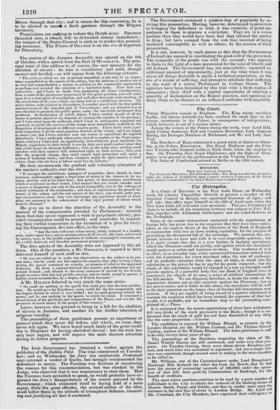The session of the Jamaica Assembly was opened on the
8th Of October, with a speech from the Earl of MuLGRAVE. The prin- cipal topic of this address is, of course, the new measure for the abolition of slavery : its tone is conciliatory and mild, though earnest and decided,—as will appear from the following extracts.
"The crisis at which we are at present assembled, is not only of an impor- tance unparalleled in the annals of the colony, but the interests it involves are of as vital and comprehensive a nature, in relation to the community represented, as perhaps ever arrested the attention of a legislative body: Your task now commences ; and I have no doubt that, postponing all minor considerations, from a sense of the paramount importance of this great question, you will enter upon it in a true spirit of conciliation, and with that thorough understanding of the actual state of the case, which can alone lead to a satisfactory decision. My active duties, with relation to this subject, I consider coeval with the first public announcement of the intended plan of Government ; and my attention was at once directed to preserve the public peace, under the inevitable excitement thus produced. In furtherance of which object, I have availed myself of all the means at present placed at my disposal, to increase the number of the garrison and I have acted upon the authority which I-had in anticipation requested and procured, to render the services of the troops more immediately available by the disposition of detachments in different country-posts. I have lately made a per- sonal inspection of all the most populous districts of the island ; and I am happy to assure you that I have nowhere seen any reason to apprehend the slightest disturbance. I have uniformly taken pains myself to explain to the Negro popu- lation, wherever I have had an opportunity, that whatever good intentions his Majesty might have in their behalf, it was by their own good conduct alone that they could insure its ultimate fulfilment ; that, in the mean time, nothing could interfere with their masters' still undoubted right to their services; that, even after the projected change, they could expect legal protection only muter a system of moderate work ; and that, whatever night be their country or their colour, those who are born to labour must live by industry."
He then recommends the gradual and voluntary relaxation of the master's authority over the slave.
" If amongst the subordinate managers of properties, there should, in some instances, unfortunately appear a disposition to strain to the utmost, in its ex- treme severity and to its latest hour, that power of discretionary punishment which is at present in their hands, I feel assured that you would consider such a course as dangerous, not only to the actual tranquillity, but to the subsequent orderly settlement of the community ; and that, as representing the general in- terests of the colony and the real owners of the slave, you would, under pre- sent circumstances, more than ever discourage any capricious stretch of disci- pline, not necessary to the enforcement of that legal portion of labour which must be obtained."
He gees on to direct the attention of the Assembly to the amount of the compensation awarded by Parliament ; reminds them that they never expressed a wish to perpetuate slavery, pro- vided compensation could be secured; and concludes by request- ing their cordial cooperation in the formation of a plan for carry- ing the Emancipation Act into effect, iii the hope, . . . " that the time will come when society, being restored to a healthy state, under equal laws, and an amalgamation of all classes, this land, so favoured by nature, may, in the prolific expansion of hitherto unexampled resources, en- joy a solid, deserved, and therefore permanent prosperity."
The fiery spirits of the Assembly were not appeased by this ad- dress. One of the members, a Mr. GROSSETT, is reported to have delivered himself of such stuff as this.
" He was not called on to make any observations on the subject in its pre- sent state ; but he could not but express his surprise that, after so long a lapse of time, the speech contained no remedy, no promise of relief to the oppressed Colonists. Ile drew a contrast between this country and unfortunate and op- pressed Ireland ; and alluded to the many centuries of misrule by the British people to coerce that fine and prolific country, and no doubt meant to pursue a similar course towards this, by a display of British bayonets."
A Mr. HYLTON followed in very much the same strain.
" He could see nothing in the speech that could give him the least satisfac- tion. He would give his Excellency every credit for the far composition and the elegant diction in which it was clothed; but he could penetrate behind the scenes, and he saw nothing in the'speech to satisfy his mind. It contained a direct breach of the privileges and independence of the House, and was but the precursor of much misery to the people of this country."
Leave, however, was granted to bring in a bill for the abolition of slavery in Jamaica, and another for the further toleration of religious worship. The proceedings of these gentlemen possess an importance at present which they never did before, and which, we trust, they never will again. We have heard much lately of the great credit due to Ministers for having abolished slavery : but the work has only been begun, and will require the most discreet attention during its future progress.














 Previous page
Previous page